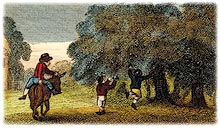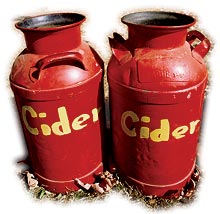When the nation’s founding fathers needed a stiff drink after a day spent dickering over articles of confederation, they had a triumvirate of alcoholic beverages from which to choose: Wine, beer and cider were all consumed by colonists with equal gusto.
If anything, cider had a slight edge over its fellow tipples, with the average 18th-century Massachusetts resident slugging 40 gallons of the stuff each year. That translates to a whopping 640 glasses, meaning early Americans likely made a habit of having cider with almost every meal.

“The apple was brought to America not to eat, but to drink,” apple historian Tom Burford explains.
But with very little fanfare, cider vanished from the established trinity of drinks. Now Burford and fellow cider believers, keen on restoring its lost preeminence, are angling to reintroduce the distinctive beverage. What was once a miniscule sliver of the market has already blossomed into a tiny segment, and industry experts are cautiously predicting further growth.
“We are at the threshold of breaking through,” Burford says. “When I look through the tunnel, I see a bright light.”
Unlike some foodstuffs whose popularity long ago peaked, the allure of cider isn’t merely nostalgic. Not quite beer and not quite wine, sweet/tart cider offers the perfect counterpoint to a wide range of foods. And at just 7.5 percent alcohol by volume, it’s remarkably easy to drink a great deal of it.
Mark Rosenstein, owner of The Market Place in Asheville, recalls serving an unheralded cider to the sometimes curmudgeonly critic Burt Wolf. “He sat straight up and said, ‘What am I drinking?’” Rosenstein recalls. The right cider, Rosenstein says, can be a phenomenal foil to good food.
Cider got off to a fine start on American shores, with some of the first settlers from the British Isles stashing bags of apple seeds in their traveling trunks. The drink ultimately weathered two fervid temperance movements and an influx of German immigrants, whose beloved beers threatened to eclipse the nation’s ciders for good, but couldn’t survive the soda-pop era. Americans who wanted something refreshing and fizzy increasingly turned to Coke. Cider, as George Washington enjoyed it, was nearly forgotten.
By the late 20th century, the once-commonplace concoction was such a rarity that domestic cider-makers had to coin the retronym “hard cider” to distinguish their product from the flat, sugary juice sold at u-pick orchards and touristy roadside stands.
Burford thinks those stand operators, who sadistically squeezed their ciders from the bland, flaccid Red Delicious, are partially to blame for the drink’s untimely demise. As Burford tells it, well-meaning 1950s mommies and daddies who treated their children to cider during Sunday country drives made a mockery of America’s cider-drinking heritage.
“These kids were being subject to something horrific: Red Delicious cider,” Burford sighs. “You have a huge generational explosion of hatred for cider.”

Burford is confident even those cider skeptics can be born again. An unapologetic apple devotee, he is leading the charge to resurrect the traditional drink. A horticulturist, orchardist and nurseryman, Burford has drawn up the plans for many of the new American cideries attempting to transform a novelty into a niche.
Burford’s family has been appling for so long that its Virginia nursery probably predates the cliché about where apples fall. The 300 years that have passed since its first saplings were planted have done little to dim Burford’s enthusiasm for the fruit.
“The apple is a particularly interesting commodity because it is one of the most unsung ones,” Burford says. “No one in the world really has to go hungry if we use apples in the right way. Apples are portable: You can carry them in your pocket. Strawberries don’t do so well. And the spectrum of taste is amazing.”
Buford has devoted much of his career to planting new trees and finding old ones; the number of listed apple varieties nationwide nosedived from 5,000 in 1905 to 10 in 1950. Burford is largely responsible for reminding apple eaters of the fruit’s diversity.
“In the world of apples, there is no equal in this country,” says Rosenstein, who recently partnered with Slow Food Asheville to host a gem of a gastronomic event: A tasting of nine ciders led by Burford.
“We are beginning to have ciders that are absolutely exquisite,” Buford says of the burgeoning American scene. While the English and French continued to hone their cider-making techniques—and still produce most of the ciders considered truly fine—market-minded Americans gave up the art. But cideries like Vintage Virginia, Belwether and Foggy Ridge are starting to build their reputations on artisanal apple beverages. Since apple trees must mature for decades before they bear cider-ready fruit, cider-making requires a tremendous amount of foresight and faith.
The embryonic nature of these brave cider-producers’ endeavor is immediately apparent with a few sips of some of their less successful experiments. “Some of these were really awful,” Burford confessed at the close of the tasting. Yet the newfound thirst for American cider is so pronounced in certain corners that most cideries are selling out their stock before its even transferred from oak cask to bottle: Even the ciders deemed unappealingly earthy, tasteless and painfully acidic by participants in Burford’s event have waiting lists.
And while none of the ciders sampled could match the sophistication of the French ciders on offer, which tasted of must and sea and fruit, a few of the Americans hit the right combination of tannin, acid, sugar and flavor. Foggy Ridge’s “Sweet Stayman,” a lovely green-gold cider, was especially good, winning points for its mouth-filling robustness.
Vintage Virgina’s eagerly awaited “Cottage Cider,” featuring fruit from the Harrison trees Burford rediscovered after a three-generation-long search, was far less palatable. Even the addition of complementary apples didn’t mute its lemony, acidic flavor. “Few apples can embody all four qualities,” Burford said, explaining cider-makers’ penchant for blending. “Some of the best ciders I have drunk have 25 varieties [in them].”
Burford expects to taste many failed ciders before the nation fully remembers how to make and enjoy its first drink.
“We don’t want to make British cider, we don’t want to make French cider,” Burford says. “We want to make American cider.”


Any reason why Henderson County’s growers can’t do this? Yes, it’s not just a case of fermenting pressed apple-juce, but there’s a market to be tapped for local ciders, and even the potential to restore the lost art of making applejack. Call it Carolina calvados.